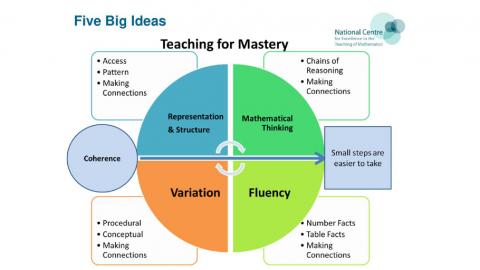Settle Primary and Maths Mastery
We have been part of a teacher research group over the last few years, working closely with our local Maths Hub and mastery specialists to develop a 'mastery' maths curriculum based on the teaching of mathematics in high-performing countries such as Shanghai and Singapore. The initiative was led my Miss Thompson as the maths subject leader who is continuing to update training opportunities where required, accompanied by Miss Wright who is leading developments in Key Stage One and the EYFS. As part of this work, teachers have taken part in lots of exciting opportunities, such as shared planning sessions with mastery specialists, external training courses and opportunities to observe each other in school and at other local specialist schools. We have continued to be involved online during lockdowns too! This has been a gradual process to fully embed a full mastery approach across school and we are committed to maintaining the excellent progress we had made pre-lockdown and will continue to improve and refine our practice with each new project we will be involved with.
A summary of our projects to date are:
Miss Thompson and Miss Wright involved in the Year long teacher research project 'Embedding Mastery'.
Two teachers in involved in 'Mastery in Mixed Age classes' programme.
Two HLTAs involved in the 'Supporting Mastery' programme.
Two teachers and one HLTA involved in the year long 'EYFS Mastery' programme.
Miss Thompson involved in the 'Greater Depth in Mastery programming' and development of resources for the NCETM.
Miss Thompson and Miss Wright involved in the Year long 'Sustaining Mastery' programme.
Last year we were accepted onto the 'Mastering Number' programme for our current Reception, Year 1 and Year 2 teachers. These sessions are now being taught in these classes and key skills have been added to our Number Fluency and Times Table progression document.
We have a second year ECT who has completed a year mastery programme on number and calculation last year and is now taking part in one for geometry and statistics. We also have the two TAs working in Reception involved in the maths conference working on mastery in EYFS workshops.
Miss Thompson has also led staff training around number fluency and times tables.
Below, you can see the five main ideas and principals that we are working towards:
Five Big Ideas in Teaching for Mastery
A central component in the NCETM/Maths Hubs programmes to develop Mastery Specialists has been discussion of Five Big Ideas, drawn from research evidence, underpinning teaching for mastery. This is the diagram used to help bind these ideas together:
A true understanding of these ideas will probably come about only after discussion with other teachers and by exploring how the ideas are reflected in day-to-day maths teaching, but here’s a flavour of what lies behind them:
Coherence
Connecting new ideas to concepts that have already been understood, and ensuring that, once understood and mastered, new ideas are used again in next steps of learning, all steps being small steps
Representation and Structure
Representations used in lessons expose the mathematical structure being taught, the aim being that students can do the maths without recourse to the representation
Mathematical Thinking
If taught ideas are to be understood deeply, they must not merely be passively received but must be worked on by the student: thought about, reasoned with and discussed with others
Fluency
Quick and efficient recall of facts and procedures and the flexibility to move between different contexts and representations of mathematics
Variation
Varying the way a concept is initially presented to students, by giving examples that display a concept as well as those that don’t display it. Also, carefully varying practice questions so that mechanical repetition is avoided, and thinking is encouraged.

